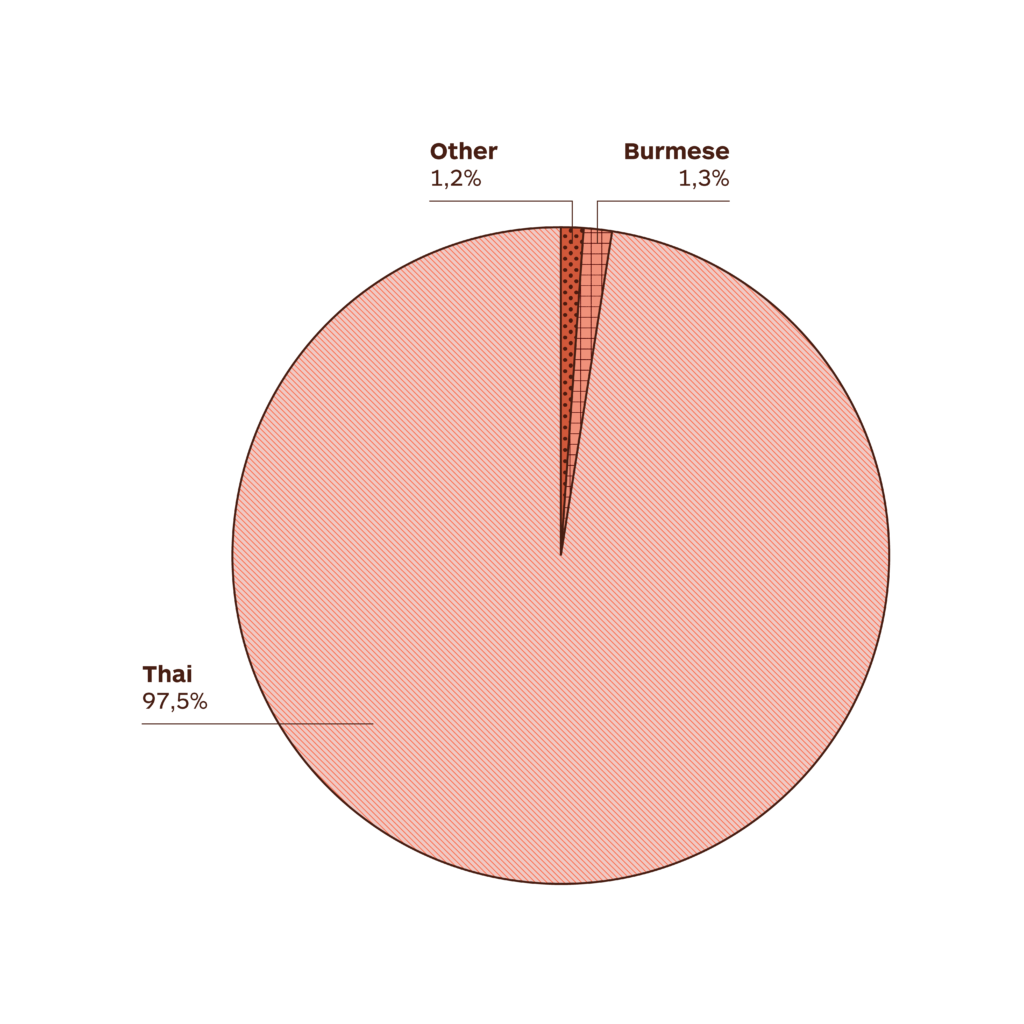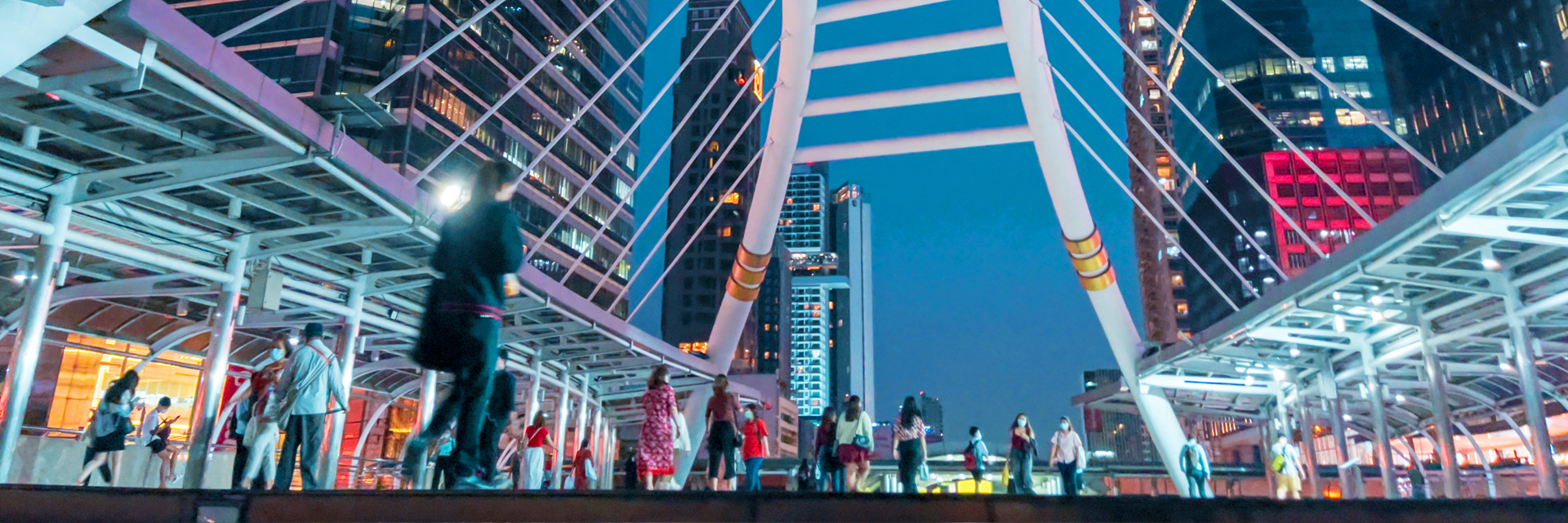Asia
To which language should you translate to localize in Thailand?
LANGUAGE INSIGHT
Official language
Thai (52.6%)
Actual languages
Thai (52.6%), Lao (23.4%), Chinese (12.3%), Malay (3.6%), Burmese (1.3%), Khmer (1.3%), Kuy (1.1%), other (4.4%).
What the top 150 best localized websites in the world do in Thailand
(Top 150 websites listed in the Global by Design ranking – published annually by Byte Level Research, this report provides a list of globally localized websites, showcasing best practices and emerging trends in their globalization)
- 84/150 localize by translating into Thai
- 1/150 localizes by translating into both Thai and Burmese
- 1/150 localizes by translating into both Thai and Hmong language
- 1/150 localizes by translating into both Thai and Simplified Chinese
- 1/150 localizes by translating into Thai, French and Simplified Chinese
- 1/150 localizes by translating into Thai, French, Portuguese, Spanish, Italian, German, Japanese, Simplified Chinese, Traditional Chinese, Ukrainian, Turkish, Russian, Romanian, Polish, Hungarian and Bahasa Indonesia
- 1/150 localizes by translating into Thai, Phu Thai, Thai (Korat), Thai (Northeastern), Thai (Northern), Thai (Southern), Thai Sign Language, Thai Song
- 1/150 localizes by translating into French, Portuguese, Spanish, German, Japanese
- 1/150 localizes by translating into Simplified Chinese
-
3M
-
ABB
-
Accenture
-
Adidas
-
Adobe
-
Airbnb
-
Aldi
-
Amazon
-
American Airlines
-
American Express
-
Apple
-
Audi
-
Autodesk
-
Avis
-
Bayer
-
BMW
-
Booking.com
-
Bosch
-
British Airways
-
Bumble
-
Burberry
-
BYD
-
Canon
-
Capgemini
-
Cartier
-
Caterpillar
-
Chevrolet
-
Cisco Systems
-
Citibank
-
Coca-Cola
-
Costco
-
Dell
-
Deloitte
-
Delta
-
DHL
-
Disney+
-
Dyson
-
eBay
-
Eli Lilly
-
Emirates
-
Ernst & Young
-
Facebook
-
FedEx
-
Ford
-
Four Seasons
-
Fujifilm
-
GE
-
Gillette
-
GoDaddy
-
Google
-
Gucci
-
Haier
-
Heineken
-
Hermès
-
Hertz
-
Hilton
-
Hisense
-
Hitachi
-
Honda
-
Hotels.com
-
HP
-
HP Enterprise
-
HSBC
-
Huawei
-
Hyatt
-
Hyundai
-
IBM
-
IKEA
-
Intel
-
InterContinental Hotels
-
J&J
-
Jack Daniel's
-
Jehovah’s Witnesses
-
John Deere
-
Kellogg's
-
Kia
-
KPMG
-
L'Oréal
-
Land Rover
-
LEGO
-
Lenovo
-
Lexus
-
LG
-
Louis Vuitton
-
Lululemon
-
LUSH
-
Marriott
-
MasterCard
-
McDonald's
-
Mercedes-Benz
-
Merck
-
Microsoft
-
Mitsubishi Electric
-
Nestlé
-
Netflix
-
Nike
-
Nikon
-
Nintendo
-
Nio
-
Nissan
-
NIVEA
-
Oracle
-
Pampers
-
Panasonic
-
PayPal
-
Pepsi
-
Pfizer
-
Philips
-
Pitney Bowes
-
Porsche
-
Procter & Gamble
-
PWC
-
Revolut
-
Rolex
-
Royal Caribbean
-
Salesforce
-
Samsung
-
Sanofi
-
SAP
-
Sephora
-
Shopify
-
Siemens
-
Sony
-
Spotify
-
Starbucks
-
Steelcase
-
Stripe
-
Subaru
-
Tesla
-
The Church of Jesus Christ of Latter-day Saints
-
Tiffany
-
Tinder
-
Toshiba
-
Toyota
-
TripAdvisor
-
Uber
-
United Airlines
-
UPS
-
Visa
-
Volkswagen
-
Volvo Cars
-
Vrbo
-
Walmart
-
Western Union
-
Wikipedia
-
Wise
-
WordPress
-
Workday
-
Xerox
-
Xiaomi (Mi)
-
Zara
-
Zoom
If you need others information, below you can find a selection of economic/social/cultural data
Introduction
Language
Official language
Thai (52.6%)
T-index
0.55%
T-Index ranks countries according to their potential for online sales.
Other languages
Lao (23.4%), Chinese (12.3%), Malay (3.6%), Burmese (1.3%), Khmer (1.3%), Kuy (1.1%), other (4.4%).
English
Very low proficiency (EF) – 97 of 111 countries/regions in the world- 21/24 position in Asia.
Conventions
Numbering system
Arabic numbering system and point as decimal separator.
Date format: yyyy-mm-dd / dd-mm-yyyy
Time: 6h system/24h time system
Country code: 0066
Demography
Capital: Bangkok
Currency: Thai baht
Population: 71,60 m
Population density: 140 /km2
Economy
GDP: 505.95 billion USD (2021)
GDP per capita: 7,066.2 USD (2021)
Exports: $243 billion (2020)
Statistics
Internet users: 77.8% penetration, 54.50 million
Unemployment rate: 1.0% (2020)
Urbanisation: 52.16% (2021)
Literacy: 94% (2021)
Language data sources: Worldatlas/Britannica//EF/Wikipedia; Demography data sources: IMF/Worldometers; Conventions data source: Wikipedia; Economy data sources: WTO/OEC/CIA/Esomar/Datareportal; Statistics data sources: Datareportal/WorldBank/UN/UNESCO/CEIC/IMF/Culturalatlas/Commisceoglobal
Facts and data
Economy
Imports
$193 billion (2019). Crude Petroleum ($15B), Integrated Circuits ($9.32B), Gold ($5.07B), Vehicle Parts ($4.95B), and Broadcasting Equipment ($4.6B), importing mostly from China ($51B), Japan ($24.5B), United States ($11.3B), Malaysia ($10.5B), and Singapore ($9.32B).
Financial inclusion factors (over 15 years of age)
• 81% have an account with a financial institution
• 9.8% have a credit card
• 8.3% have a mobile money account
• 19% make online purchases
Ease of doing business
Easy to conduct business (80.1 out of 100) 5th out of 24 East Asian and Pacific countries, and 21st worldwide out of 190 countries (2022, World Bank).
Global Innovation Index
Ranked 9th out of 17 Central and South-Eastern Asian and Oceanic countries, 43rd out of 132 worldwide.
The Global Innovation Index captures the innovation
ecosystem performance of 132 economies and tracks the most recent global innovation trends.
Exports
$243 billion (2020). Office Machine Parts ($17.2B), Gold ($14.3B), Integrated Circuits ($9.17B), Cars ($8.28B), and Vehicle Parts ($6.54B), exporting mostly to United States ($35.3B), China ($30.2B), Japan ($23.2B), Hong Kong ($11.8B), and Vietnam ($11.2B).
Main local online stores
Lazada, Kaidee and 11street. Other top retail sites include Zalora, Shopee, Central.co.th, Agoda.com, Traveloka, Tarad.com and Ensogo.
Economic freedom
Moderately free (60.6 out of 100) 16th out of 39 countries in Asia Pacific, and 80th worldwide out of 186 countries (2022, Heritage Foundation and Wall Street Journal).
Economy data sources: WTO/OEC/CIA/Esomar/Datareportal
Service Exports (2020)
Source: OEC
Service Imports
Source: OEC
Most specialised products by RCA Index
Specialisation is measured using Revealed Comparative Advantage, an index that takes the ratio between Thailand observed and expected exports in each product
Source: OEC
Most complex products by PCI Index
Product Complexity Index measures the knowledge intensity of a product by considering the knowledge intensity of its exporters
Source: OEC
Export Opportunities by Relatedness
Relatedness measures the distance between a country's current exports and each product, the barchart show only products that Thailand is not specialized in
Source: OEC
Share of online payment methods in Thailand in 2019
Source: J.P. Morgan 2019 Payment Trends
E-commerce payment methods in Thailand, split by value
Source: J.P. Morgan 2019 Payment Trends
Preferred e-commerce methods in Thailand
Source: J.P. Morgan 2019 Payment Trends

T-index
Reach most of the online purchasing power
T-Index ranks countries according to their potential for online sales. It estimates the market share of each country in relation to global e-commerce.
Try it nowMedia
Media main languages
Thai, English
Information channels
The government and military control nearly all the national terrestrial television networks and operate many of Thailand’s radio networks. Multichannel TV, via cable and satellite, is widely available. The radio market, particularly in Bangkok, is fiercely competitive. There are more than 60 stations in and around the capital. The media are free to criticise government policies and cover instances of corruption and human rights abuses, but journalists tend to exercise self-censorship regarding the military, the monarchy, the judiciary and other sensitive issues. Restrictions on media output accompanied the introduction of martial law and an army coup in May 2014. Print media are largely privately-run, with a handful of Thai-language dailies accounting for most newspaper sales.
The press
Bangkok Post – English-language
The Nation – English-language
Daily News – mass-circulation Thai-language daily
Thairath – mass-circulation Thai-language daily
Television
Thai TV3 – operated by the Mass Communications Organization of Thailand (MCOT), a government agency
TV5 – owned by Royal Thai Army
BBTV Channel 7 – owned by Royal Thai Army
ModerNine (Channel 9) – operated by government agency MCOT
Thai Public Broadcasting Service (TPBS) – public TV, created under 2008 legislation
Radio
Radio Thailand – national network and external service operated by National Broadcasting Services of Thailand (NBT), part of government Public Relations Department
MCOT Radio Network – run by government agency MCOT; operates stations in Bangkok and provincial networks
Army Radio – owned by Royal Thai Army
Internet
MCOT online news – English-language pages
Media data source: BBC
Internet Data
Internet users 77.8% penetration, 54.50 million
Share of web traffic by device
54.95% mobile phones, 42.26% computers (laptops and desktops), 2.78% tablet devices
Median speed of mobile Internet connection 31.91 Mbps
Median speed of fixed Internet connection
171.37 Mbps
Mobile connection as a percentage of total population: 136.5%
Percentage of mobile connections that are broadband (3G-5G): 100%
Most popular web search engines
Google (98.58%), Bing (0.76%), Yahoo (0.49%), Petal Search (0.05%), Naver (0.05%), DuckDuckgo (0.04%),
Most used social media
Twitter (63.64%), Facebook (30.38%), YouTube (2.52%), Pinterest (1.82%), Vkontakte (1%), Instagram (0.39%)
Internet data sources: Datareportal/Statcounter
Social statistics
Life expectancy
76.68 yrs (2017)
Gender
Thai culture is rather contradictory on gender issues. On the one hand, women are exalted because they represent motherhood, which is deeply revered, on the other hand, Thailand is still very much a male chauvinistic society, with males traditionally holding power. It is noteworthy that Thailand has never had a queen as the head of the kingdom. In theory, there is no cultural or legal restriction on the participation of females at any level of governance or corporate ranks. Indeed, Thai women play very active roles in the country’s economic system and the creation of wealth, especially at the grassroots level. Females dominate in certain professions or careers, e.g. teaching and sales. However, sexual equality, in all respects, is still to be attained.
Ethnicity
Thankfully, Thais have few ethnic problems among their own ranks, though the population consists of several ethnic groups such as the native Thais, the Chinese and the Muslims.
Healthcare expenditure
3.71% of GDP (2016)
Religion
About 95% of the Thais are Buddhist. Buddhism is a way of life, which permeates almost everything that the Thais think or do. Actions are usually referenced against Buddha’s teachings to determine whether they are right or wrong. Religious practices, rituals and ceremonies have great influence in the workplace. For example, new businesses must be blessed by revered monks before they open for business. Large donations are given to temples each year for corporate or individual intentions.
Class
Class has become less important in Thai society. It used to be very important during the absolute monarchy. Now it is largely replaced by financial status. The old rich and nouveau riche create their own hierarchy of classes with the poor at the bottom. The upper classes (rich) tend to secure their status through nepotism in the workplace. The poorer classes often see the only way to move up the class ladder as buying their way up. Of course, there are those who get there through qualifications and hard work, but in general, the poor are left where they have always been.
Social statistics sources: WorldBank/UN/UNESCO/CEIC/IMF
Tertiary education in Thailandia
Source: UNESCO
Tertiary education in Thailand by sex
Source: UNESCO
The Data Factbook is a work in progress project. Our community is helping us to fill it up always with new and updated data. Your contribution is precious. If you want to help us, please write your advices at imminent@translated.com
Languages research
Languages spoken in Thailand

The geographical distribution of languages that you will find in the maps published in this section is a work in progress. Our community is helping us to fill it up with always new and updated data. Your contribution is precious. If you want to help us, please write to imminent.factbook@translated.com
Photo credit: Surasit Laopa, Unsplash


